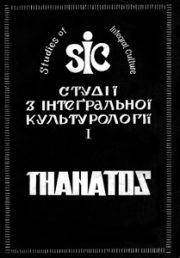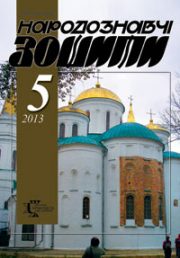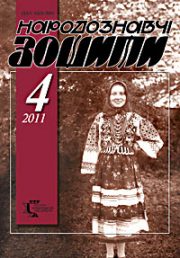The Ethnology Notebooks. 2020. № 3 (153), 695—713
UDK 94:061.22 ПРОСВІТА”1868/1870″
DOI https://doi.org/10.15407/nz2020.03.695
THE «PROSVITA» SOCIETY. BEGINNING OF PRACTICE (1868—1870)
PASHUK Volodymyr
ORCID ID: https://orcid.org/0000-0002-3536-1848
Candidate of Historical Sciences,
Senior Researcher at the Institute of Ukrainian Studies
named after I. Krypjakevych NASU of Ukraine,
4, Kozelnitskaya Street, 79000, Lviv, Ukraine,
Contacts: e-mail: volparo@gmail.com
Abstract. The research is aimed at a comprehensive study of the «Prosvita» Society activities initiation since this topic, despite its importance, did not find adequate coverage in scientific publications which determines its topicality. The purpose is a thorough and comprehensive disclosure of the process of beginning of a newly formed public organization. The tasks involve clarification and analysis of activity types, development of organizational forms, occurrence of difficulties and results. The subject of the study is the action (mainly of the first Board), aimed at establishing the activity of the newly established institution, which functioned from December 1868 to May 1870, which determines the chronological framework of the work. The object is the Galician public movement, focused on the emergence and expansion of the activities of the «Prosvita» Society. Methods used for the study are followed: problem-chronological method, description, complex-structural analysis and synthesis.
On the basis of archival materials the actions of the first Board of the «Prosvita» Society were traced. First of all, there were analyzed the conceptual decisions of the Lead concerning the definition of measures that should have helped to start the activity. These included a well-intentioned effort to focus on building a strong organization that could be achieved by attracting as many Enlightenment members from different parts of Ukraine as possible. The spelling issue was resolved by a differentiated principle according to which, despite the declarative commitment to phonetics, the works for people were planned (at least at first) to be published in familiar to the Galician etymology and scientific explorations in phonetics, and to issue an explanation to the public about the need for a new educational organization, its intentions and its call for the people to support the new institution. Separately are outlined the activities of the Lead, aimed at upholding the position of the «Prosvita» Society independence, which was prompted by the proposal of the Polish Krakow organization to join efforts. Actions for writing and publicizing the report to the public are described in detail, which have defined the format of preparation for printing of the «Prosvita» editions in the future which included the creation or ordering texts, submitting them to the Lead for evaluation, editing, amendments and only after — the decision to see the world.The issue of textbooks for secondary schools was characterized by the struggle for a gymnasium with the Ukrainian language of study. For the approval of this status there were needed textbooks provided by the «Prosvita» Society. The activity of the Lead is aimed at the development of the organizational structure of the Society — adoption of a new Charter, preparation of a " certificate of membership" membership~ID, obtaining a subvention from the Galician regional Sejm, establishing relations with Slavic organizations and measures for the preparation of the first General Meeting of the Society.
Keywords: «Prosvita» Society, beginning of practice, first «guidance», Slavic enlightenment organisations.
Received 30.03.2020
REFERENCES
Perskyi, S. (1932). Popular History of the «Prosvita» Society. Lviv [in Ukrainian].
Serediak, A. (1993). Activities of the «Prosvita» Society in 1868—1914. An Essay on the History of the «Prosvita» Society. Lviv; Krakiv; Paris [in Ukrainian].
Protocols of the Prosvita Society (Vol. I). Central State Archives of Ukraine, Lviv. F. 348. Description 1. Case 7628 [in Ukrainian].
Pashuk, V. (2003). The birth of Ukrainian and Polish enlightment movements. Comparative Analysis of the Problem of the History of Ukraine XIX — early XX centuries (Issue VI, pp. 226—244). Kyiv [in Ukrainian].
(1869). Dear Countryman. Lviv [in Ukrainian].
Pashuk, V. (2014). Contribution of «Prosvita» Society to the formation of T. Shevchenko’s cult in Galicia. First steps. 1868—1876. Lviv [in Ukrainian].
Pashuk, V. (2010). A manifestation of the ideological foundations of the «Prosvita» Society. Ukraine. Cultural heritage, national consciousness, statehood: «Prosvita» Society is a guard of independence and catholicity of Ukraine (Pp. 34—56). Lviv [in Ukrainian].
Pashuk, V. (2010). «Dear Countryman!» — Expression of the «Prosvita» Society Ukraine. Cultural heritage, national consciousness, statehood: «Prosvita» Society is a guard of independence and catholicity of Ukraine (Pp. 129—137). Lviv [in Ukrainian].
(1869). Dawn. Reader for rural people. The first book. Lviv [in Ukrainian].
Kachala, S. (1869). What harm us and what can help us. A story to the ruthenians peasants. Lviv: Vydannia Tovarystva «Prosvita» [in Ukrainian].
(1869). How to best care for animals. The Folk Calendar for the year 1870 (P. 37). Lviv: Vydannia Tovarystva «Prosvita» [in Ukrainian].
(1869). How to prevent manure shortages. The Folk Calendar For The Year Ordinary 1870 (Pp. 37—38). Lviv: Vydannia Tovarystva «Prosvita» [in Ukrainian].
(1869). How to take care of horses. The Folk Calendar For The Year Ordinary 1870 (Pp. 38—39). Lviv: Vydannia Tovarystva «Prosvita» [in Ukrainian].
(1869). How to get rid of worms in the garden. The Folk Calendar For The Year Ordinary 1870 (P. 40). Lviv: Vydannia Tovarystva «Prosvita» [in Ukrainian].
(1869). How to breed good asparagus. The Folk Calendar For The Year Ordinary 1870 (P. 41). Lviv: Vydannia Tovarystva «Prosvita» [in Ukrainian].
(1869). How and when to sow barley. The Folk Calendar For The Year Ordinary 1870 (P. 42). Lviv: Vydannia Tovarystva «Prosvita» [in Ukrainian].
(1869). About sheep disease. The Folk Calendar For The Year Ordinary 1870 (P. 43). Lviv: Vydannia Tovarystva «Prosvita» [in Ukrainian].
Sharanevych, I. (1869). Kyiv and Novgorod in the year 1470 and 1471 chronicle. The Folk Calendar For The Year Ordinary 1870 (Pp. 6—16). Lviv [in Ukrainian].
Navrotskii, V. (1869). Something about Cossacks and their military councils. The Folk Calendar For The Year Ordinary 1870 (Pp. 17—23). Lviv [in Ukrainian].
Seletskyi, K. (1869). Catechism for children of Greek Catholic rite. Lviv [in Ukrainian].
Latin syntax (Part 2). The science of times and methods. Lviv [in Ukrainian].
Partytskyi, O. (1869). Latin grammar, in ruthenians language for students of academic ruthenians high school in Lviv. Lviv [in Ukrainian].
Polianskyi, M. (1869). Natural history for students of the academic ruthenians high school in Lviv. Lviv [in Ukrainian].
(1869). Reportes from the first general meeting of the Prosvita Society. Lviv [in Ukrainian].
(1996). The charter of the reading room «Prosvita» in … Lviv, 1869. Prosvita Society in Lviv: Index of Editions (1868—1939) (P. 26). Lviv [in Ukrainian].






